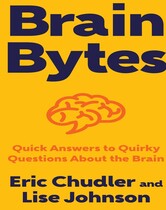Author: Eric Chudler and Lise Johnson
ISBN-13:
9780393711448
APA Style Citation
Chudler, E. H., & Johnson, L. A. (2017). Brain bytes: Quick answers to quirky questions
about the brain. W.W. Norton & Company.
Buy This Book
https://www.amazon.com/Brain-Bytes-Answers-Quirky-Questions/dp/0393711447
| activity_brain_bytes.pdf |
If you cover neuroscience in your psychology course, you know it is a fascinating topic about which students have many questions. In Brain Bytes, Quick Answers to Quirky Questions, neuroscientists Eric Chudler, Ph.D., the Executive Director of the Center for Sensorimotor Neural Engineering at the University of Washington, and Lise Johnson Ph.D. who is a scientist in the Department of Neurological Surgery at the University of Washington teamed up to provide you with some of the answers. Chudler has an amazing website (see other related resources) called Neuroscience for Kids, which is a treasure of information, activities, and resources for students of all levels interested in learning more about the brain that is updated regularly.
The book provides answers to questions commonly asked by introductory psychology students and is organized into twelve key categories. The authors encourage students to keep asking questions and to verify the responses presented with other sources. The book also includes several key appendices that provide even more information. The twelve categories are listed below, along with a sample of the research questions that are presented for each topic area.
Ancient Neuroscience
- Did people always believe that the brain was important?
- Did people really believe that the bumps on a person’s head would say something about a person’s intelligence and personality?
- How did parts of the brain get their strange names?
- How are the two halves of the brain connected?
- Do we get more neurons after we are born?
- Does the brain really use electricity to send messages?
- What is the difference between a neuroscientist and a neurologist?
- Who was H.M.?
- Who was Tan?
- Are there foods that make people smarter?
- Does listening to music make you smarter?
- Does watching television, playing video games, or surfing the Internet kill brain cells?
- Is memory like a tape recorder, flash drive, or hard drive?
- Can memories be erased?
- What was so special about Albert Einstein’s brain?
- Why do we sleep?
- Why do we dream?
- Can you learn while you’re asleep?
- What is lucid dreaming?
- Would I feel anything if my brain was touched?
- Do all people experience pain?
- What is phantom limb pain?
- What is synesthesia?
- What causes color blindness?
- Why can’t I tickle myself?
- Does alcohol kill brain cells?
- How does coffee wake me up?
- Is marijuana addictive?
- Is ecstasy dangerous?
- What animals have venom that attacks the nervous system?
- How do you become a brain researcher?
- Does the brain work like a computer?
- Why do songs get stuck in my head?
- Can a computer be used to control my brain?
- Are brain transplants possible?
- What is a cochlear implant?
- What is brain stimulation?
- What is schizophrenia?
- What is prion disease?
- Can marijuana be used to treat epilepsy?
- What is face-blindness?
- What is the most common mental health issue?
- What is electroshock therapy, and why is it used?
- What can I do to keep my brain healthy?
- What happens to the brain as it ages?
- Why do my eyes hurt when I walk outside after being inside a movie theatre?
For even more information about brain facts and neuroscience trivia, consider subscribing to the authors monthly Neuroscience for Kids Newsletter. This monthly email will keep you updated on the latest information on the website and in the field of neuroscience. The newsletter includes the latest updates to the website, a neuroscience website of the month, neuroscience in the news, information on contests and research programs, media alerts, and a section titled “Treasure Trove of Brain Trivia.”
Other Related Resources
Neuroscience for Kids Website
https://faculty.washington.edu/chudler/neurok.html
Brain Bytes Eric Chudler and Lise Johnson Talks at Google
https://www.youtube.com/watch?v=HdI0Qv0g3cU
Psychological Figures and Concepts
Paul Broca
Walter Freeman
Phineas Gage
Galen
Franz Joseph Gall
Patient H.M.
Oliver Sacks
William Beecher Scoville
Tan
Karl Wernicke
Addiction
Amnesia
Aphasia
Brain imaging
Brain regions
Catatonia
Chronic traumatic encephalopathy
Color vision
Dissociative identity disorder
Face blindness
Hallucinations
Hearing loss
Hypnosis
Hormones
Lucid dreaming
Medications
Memory
Mental illness
Neurons, neurotransmitters, and neural transmission
Neurological diseases
Neurologist
Neuroscientist
Neurotoxins
Neurotransmitters
Pain
Perception
Psychoactive drugs
Rorschach test
Sleep
Split-brain
Stroke
Traumatic brain injury
Venom

 RSS Feed
RSS Feed